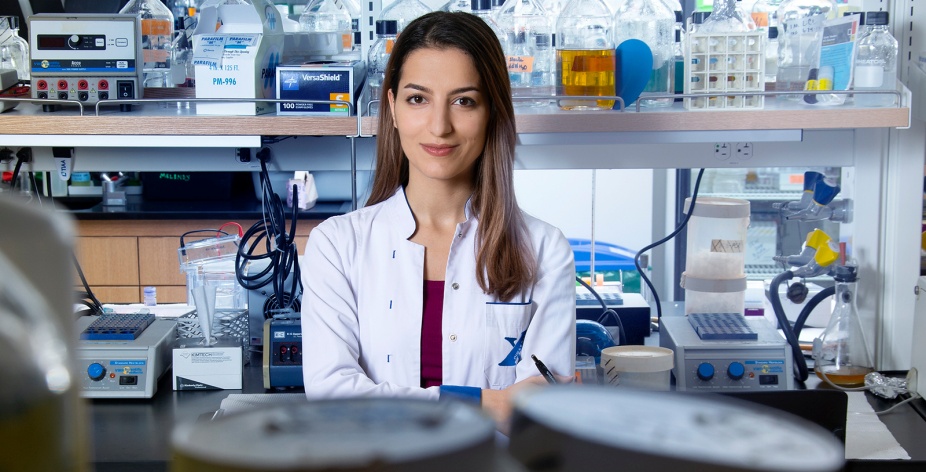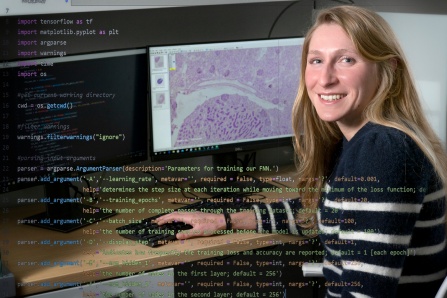Future Students

Who Is the Scientist You See Your Future Self to Be?
Biomedical research training is about discovery — scientific discovery and self-discovery. Our programs and mentors are prepared to be with you every step of the journey to your future. We invite you to explore our innovative curriculum, rigorous research training and supportive and inclusive environment.
Chat with an Ambassador
Put Your Passion Into Practice

With 14 master’s programs, an interdisciplinary doctoral program, a comprehensive MD-PhD program, and undergraduate research, you have more than options here — you have opportunity.
From behavioral neuroscience to cancer biology to regenerative medicine, whatever biomedical science research you’re into, you’ll get to work closely and collaboratively with our world-renowned researchers.
Our Interdisciplinary Approach
Buffalo’s grain silos tower over its inner harbor, and as the City of Buffalo finds new ways to repurpose those historic silos, here in the Jacobs School, we’re tearing silos down!
Our interdisciplinary curricula, our graduate programs, and our collaborative faculty are all working to make sure that students receive broad foundational training no matter what degree is written on their diploma. Even in our specialized departments, there are opportunities to cross-train through coursework, workshops and collaboration. As biomedicine becomes broader and broader in scope, our programs adapt to provide students educational opportunities at the forefront and intersection of science and medicine.
Academic Health Center
The University at Buffalo Academic Health Center brings together the talents of clinicians, educators and researchers to provide a superb research and educational environment to foster basic discovery in the biosciences, health-sciences translational research, preventive and interventional clinical trials, as well as superb clinical care. We train the next generation of health care practitioners.
Benefits
- We are distinct and one of only a few that include the full complement of health schools.
- We provide a unique environment by merging educational training, patient care, health-sciences translational research, and clinical trials.
- We are committed to collaboration with our centralized location in downtown Buffalo at the new home of the Jacobs School of Medicine and Biomedical Sciences.
How Anthony A. Campagnari, PhD, and Mark Ehrensberger, PhD, collaborated across silos to develop an innovative device to treat infections on metallic implants.
As a public school in the SUNY system, the University at Buffalo has a worldwide reputation for excellence but costs much less than private schools. Combine those accolades with the low cost of living in Western New York and funding opportunities, and your return on investment will prove hard to beat.
Applying to graduate, professional, and research programs can be overwhelming! Let us help you. These free resources will guide you as you prepare your application, decide which programs to apply to, and ultimately complete your application.
How to Apply to Grad School

Are you looking for a fulfilling career, but know you'll need more training? That next step can be intimidating, so we guide you through the process. With our faculty experts by your side, you'll master current concepts and research skills, empowering you with the confidence to launch a successful career in the biomedical sciences.
Download our workbook today, and we'll walk you through our 5 tips to prepare you for success!
How to Apply to Grad School YouTube Series
How to Choose a Mentor Workbook
Is selecting a research mentor in your near future? Already feeling overwhelmed by the process?
Don't worry, we've compiled a workbook just for you! How to Choose a Mentor: 7 Steps to Find the Perfect Match is available to download at the link below.
You'll learn what makes a good mentor, how to prioritize your wishlist, how to craft an introductory email, and so much more. Download your workbook, and get started today!

An MD-PhD allows you to train in both medicine and research. Physician scientists focus on the intersection of science and medicine, treating patients and conducting research from both perspectives.
Typically, MD-PhD programs take 7 to 9 years to complete. Most MD-PhD graduates train in a residency program and become licensed to practice in a specific field of medicine. From there, they typically go on to careers that blend research and clinical medicine, though their research topic may or may not be closely related to their field of medical practice. Most MD-PhDs work in academic medical centers, such as medical schools or teaching hospitals. MD-PhDs also conduct research in institutes such as the National Institutes of Health or other government or private agencies, or they work for pharma or biotech companies.
As Early as Possible
Coursework
Remember that your GPA will be calculated from the first undergraduate course you take. This is one of the first factors that an admissions committee will look at. Many committees, including UB’s, take a holistic approach, so while there may not be cutoff scores, it is still a very important factor.
Prehealth advising
Get in touch with your prehealth advising office right away. It will be important to make sure you are following their guidelines as early as possible.
2 to 3 Years Prior
Explore your options and schools
- See which programs have the best fit for you, based on research, program structure and faculty mentors.
- Engage with programs by joining mailing lists and attending fairs and events.
Coursework
Make progress toward completing prerequisite coursework. Many programs will have the same prerequisite course requirements as their regular MD program, but you’ll want to verify this. Based on our curriculum, we strongly encourage you to take a statistics course as well as courses in biochemistry, genetics and molecular biology. In addition, it is not required that you earn your degree in a science field, as long as you have the required prerequisite courses. All majors are welcome!
Clinical experience
Knowing what you’re getting into when you want to be a physician is very important. Remember, it’s not what we see on TV! Get experience early by volunteering, shadowing, becoming an EMT/CNA, scribing, etc.
Research experience
Participate in research early during your undergraduate years, either during the semester or through summer programs.
Letters of recommendation
Begin to build relationships with potential letter writers. You should expect to have a letter from each research or clinical mentor with whom you’ve worked.
1 to 2 Years Prior
MCAT
Start studying as early as possible and prepare for the possibility that you may need to take the exam more than once to get competitive scores.
Clinical experience
Continue to work or volunteer in a health care setting.
Research experience
Talk early with your research mentor about the possibility of presenting your research or publishing. If doing a master’s program or taking a gap year(s), be sure that you are participating in research.
Letters of recommendation
Determine who your letter writers are going to be. You will need at least three but can submit more. Many prehealth advising offices will also write a committee letter. Make sure that you give all writers plenty of time.
Essays
MD-PhD applicants will have three application essays:
- Personal Statement
- MD-PhD essay, which asks about your reasons for pursuing the dual degree program
- Significant Research Experience essay, which asks for details about the scientific research you have conducted
Have several people look these over, including mentors, your prehealth advising office, and/or your school’s writing center.
Year of Applying
Apply!
You should submit your application materials as early as possible. Application deadlines will vary by program, but most will prioritize early applicants. Once your primary application has been processed by AMCAS, you will receive information on how to submit the supplemental application. UB’s priority deadline is October 1.
If offered, prepare to interview
- If you are invited to interview, you should practice beforehand with mentors and your career services office. Remember, you are also interviewing the school to see if they are a good fit for you!
- The interview structure will vary by school. At UB, you will be interviewed by both the regular MD and MD-PhD admissions committee during the same visit.
Provide updates
Most programs will allow you to submit updates to your application, such as new publications, etc. You should continue to do so until a decision has been reached on your application.